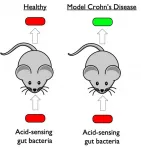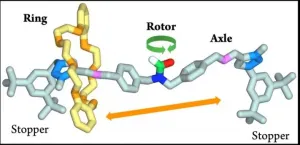Heart failure, which happens when the heart can't pump blood the way it should because it is too weak or stiff, is the leading cause of hospitalizations in people 65 and older. Many of these patients are never able to return to their previous level of functioning--resulting in reduced independence and increased risk of returning to the hospital or dying.
"These patients have persistently poor outcomes with frequent rehospitalizations, poor quality of life, high rates of dying and high health care costs," said Dalane W. Kitzman, MD, professor of cardiovascular medicine and geriatrics/gerontology at Wake Forest School of Medicine and the study's lead author. "Despite many efforts to improve outcomes in these patients, most studies testing a wide range of medications, devices and strategies have been negative. This suggested to us that we were overlooking an important factor contributing to these poor outcomes, and we suspected the missing factor might be severe physical dysfunction, which is generally not addressed in heart failure management."
In an earlier pilot study, Kitzman and colleagues found that older patients admitted to the hospital with acute heart failure had profound deficits in all domains of physical function, including their balance, mobility and strength, not just in endurance, which would have been expected. Nearly all of these patients (97%) were considered frail or prefrail.
"Even before they are hospitalized, these patients already have lower physical functioning due to both aging and their chronic heart failure, and when their heart failure worsens, their physical function deteriorates further and this can then be exacerbated by the hospital experience and bed rest," Kitzman said. "This sequence of events leading to marked impairments in all domains of physical function and its impact on patient outcomes has been largely overlooked."
With these insights, the REHAB-HF rehabilitation intervention was developed and designed to correct deficits in balance, mobility and strength. REHAB-HF seeks to enhance effectiveness and avoid injuries that can occur when frail older persons undertake traditional cardiac rehab programs that are more focused on endurance. The program was tailored to each patient's specific needs and adjusted to their ability level as they progressed. Unlike traditional cardiac rehab programs that typically start six weeks after a hospitalization, the REHAB-HF program started early--during the patient's hospital stay if possible--and transitioned to three outpatient sessions per week for 12 weeks following hospital discharge. The aim of the current REHAB-HF trial was to evaluate whether this novel rehabilitation program could improve physical function (primary outcome) and rehospitalizations (secondary outcome) when compared to usual care that could include physician-ordered physical therapy or traditional cardiac rehab.
A total of 349 patients across seven different hospitals, including four community hospitals, were enrolled in the study. Patients ranged in age from 60-99 years; over half were women and 49% were from underrepresented racial or ethnic minority groups. Notably, 53% had heart failure with preserved ejection fraction (HFpEF). Overall, they had an average of five comorbidities, most commonly high blood pressure, diabetes, obesity, lung disease and kidney disease, which may also contribute to declines in physical function.
At the three-month follow-up, compared with participants randomized to receive usual care, those in the intervention group had notable and significant improvements in physical functioning and quality of life across all the assessments used. For example, the Short Physical Performance Battery, a standard measure of physical function in older adults, improved by 1.6 units--more than twofold greater than the minimum amount that is meaningful to patients. On the six-minute walk test, they were able to walk 34 meters farther, a large improvement compared to very low function at baseline. Participant scores on the Kansas City Cardiomyopathy Questionnaire, which measures the patient's perception of their health status, and a separate depression survey also showed large improvements. The improvements in physical function in the REHAB-HF intervention group were even greater when compared to the subset of usual care patients who had received traditional physical therapy and/or cardiac rehab as part of their physician's orders, further supporting the effectiveness of the REHAB-HF intervention.
At six months, 83% of patients were still doing their exercises, which Kitzman said bodes well for long-term adherence. However, there were no statistically significant differences in clinical events, including rates of readmission for any reason, with 194 and 213 rehospitalizations occurring in the intervention group and usual care control group, respectively. Heart failure-related hospitalizations were also no different (94 vs. 110) at six months. There were numerically more deaths among people in the rehab group (21 vs. 16), but this was not statistically significant; researchers said this result may have been due to chance.
"The study was not large enough to really look at clinical events. But patient preference surveys show that older patients often value improved function and quality of life independently of rehospitalization and death," Kitzman said. "By improving quality of life and physical functioning, the patient feels better, which is a positive outcome for patients."
Kitzman and his collaborators at Duke University School of Medicine and Thomas Jefferson School of Medicine are now investigating whether certain subgroups of patients (for example, those with HFpEF) saw more benefits, which could inform a subsequent larger trial powered to definitively examine effects on clinical events.
INFORMATION:
This study was simultaneously published online in the New England Journal of Medicine at the time of presentation. It was funded by the National Institute on Aging.
Kitzman will be available to the media in a virtual press conference on Sunday, May 16, 9:45 a.m. ET / 13:45 UTC.
Kitzman will present the study, "A Novel Physical Rehabilitation Intervention for Older Patients with Acute Decompensated Heart Failure: The REHAB-HF Trial," on Sunday, May 16, at 8 a.m. ET / 12:00 UTC, virtually.
ACC.21 will take place May 15-17 virtually, bringing together cardiologists and cardiovascular specialists from around the world to share the newest discoveries in treatment and prevention. Follow @ACCinTouch, @ACCMediaCenter and #ACC21 for the latest news from the meeting.
The American College of Cardiology envisions a world where innovation and knowledge optimize cardiovascular care and outcomes. As the professional home for the entire cardiovascular care team, the mission of the College and its 54,000 members is to transform cardiovascular care and to improve heart health. The ACC bestows credentials upon cardiovascular professionals who meet stringent qualifications and leads in the formation of health policy, standards and guidelines. The College also provides professional medical education, disseminates cardiovascular research through its world-renowned JACC Journals, operates national registries to measure and improve care, and offers cardiovascular accreditation to hospitals and institutions. For more, visit ACC.org.
Media Contacts
Nicole Napoli
202-669-1465
nnapoli@acc.org
Thy-Ann Nguyen
703-479-3642
thyann.nguyen@curastrategies.com



